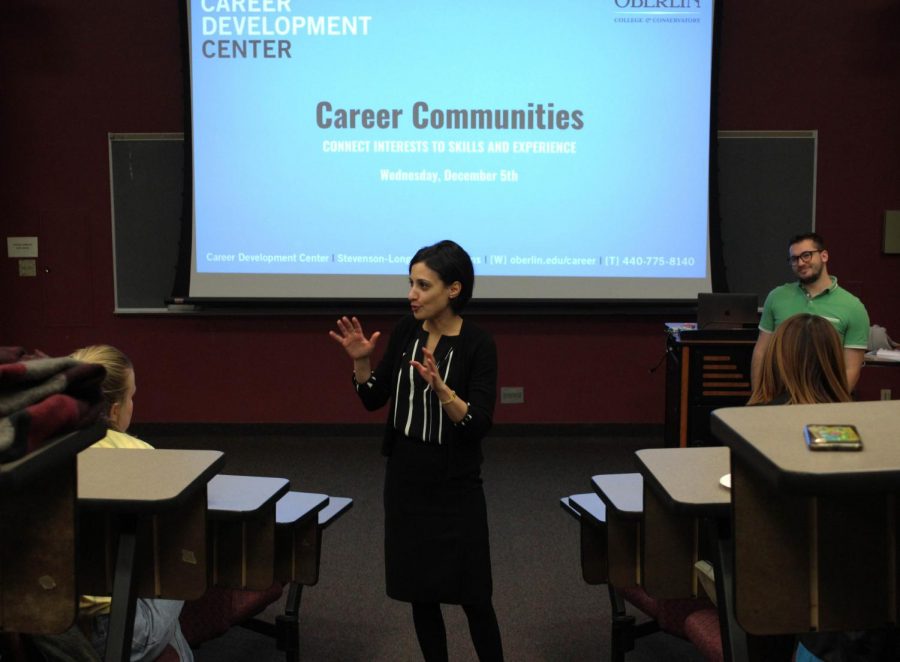New Career Communities Pilot Announced
Associate Dean of Students Dana Hamdan explains the Career Communities initiative at an information session Wednesday, Dec. 5 in King Building.
Associate Dean of Students and Interim Director of the Career Development Center Dana Hamdan unveiled the pilot for the Career Communities program in a series of four information sessions earlier this week and last. The program will launch this spring and will allow roughly 120 juniors and seniors to participate in a one-credit, co-curricular course that culminates in a funded summer internship.
“The Career Communities initiative makes it possible for us to address Oberlin’s ‘missing link,’ if you will, for supporting students in making the transition from college to career,” Hamdan wrote in an email to the Review. “The learning goals of the program are to help students (1) understand and articulate the transferable skills they have developed at Oberlin, (2) develop a professional network of mentors and potential employers, [and] (3) explore possible career paths through internships. This aligns with the Career Development Center’s larger strategy of supporting students [as they] prepare for life after Oberlin in educationally and developmentally appropriate ways.”
The info sessions, which ran from Nov. 29 to Dec. 5, pitched the program to students as an opportunity to workshop essential job skills and get direction for career plans. After outlining the program’s basic structure, Hamdan answered questions and addressed potential concerns.
Many of those in attendance raised questions around financial accessibility. Hamdan explained that the program includes a guaranteed funded internship for each participant, which the Career Development Center is in the process of securing through parents, alumni, and partnerships with local, national, and international businesses and organizations.
Current offerings include opportunities at Google, CBS Paramount, Columbia Pictures, Princeton Architectural Press, and the Project on Middle East Democracy, to name a few.
The program currently has four communities — Business, Finance, and Consulting; Non-Profit and the Public Sector; Arts and Creative Professions; and Entrepreneurship and Innovation. Each will accept 30 students. The plan is to roll out five more communities in fall 2019, namely: Medical, Public, and Global Health Professions; Science and Technology; Education; Law and Public Policy; and Professions in Music.
This new structure marks a change from the initial Career Communities program pitched earlier in the semester. In September, the communities were constructed around Wisr, a networking platform used by the College, and featured an expert advisor with experience in the relevant industry. Now, the program has mostly moved off Wisr and will focus more on preparatory workshops.
Before committing to a summer internship, participants will meet with their communities five times during the spring semester and work with their peers as part of a one-credit, co-curricular module course. The five sessions will cover the following topics, tailored to each community: discovering your path, connecting to your major, course selection, improving your communication skills, building your network, and articulating your value. The decision to revamp the program received strong support from President Carmen Ambar as well as students concerned about entering the job market.
“The Career Communities initiative will help students articulate the connections between their academic and co-curricular learning and potential career pathways,” wrote Ambar in an email to the Review. “It will do this by offering faculty and professional mentorship, and by providing timely opportunities for internships and cohort support that draws on the powerful tradition of ‘Obies helping Obies.’ The Career Communities initiative is designed to ensure that students find ways to translate the transformational learning they experienced at Oberlin into careers of leadership, service, and changing the world for good.”
College senior Sadie Keller, a peer advisor in the Career Development Center, expressed similar sentiments, adding that the program could help students navigate internships and prepare them for the job market.
“Obies naturally help each other; it’s just what we do,” Keller said. “The career communities feel like a long-needed institutionalized version of these values. My professional experiences have come from help from professors, the Career Center, and fellow peers. My [first] year I just assumed I’d have to figure it out alone. These programs are going to be a huge help for both individual student success and creating a more cohesive community.”
College junior Leo Hochberg heard about the program from a Nov. 14 email from Hamdan, heralded by the much-discussed subject line, “Let’s get this bread.”
“If I wasn’t going abroad I’d apply now … I’m applying when I get back,” he said. “I think it is a fantastic way to start my career right after Oberlin.”
In addition to providing her approval, President Ambar sent a call to action for parents and alumni to help source potential internships. Several have already responded.
The program was created in part to address student concerns about finding jobs after graduation. In a September interview with the Review, Dean of Students Meredith Raimondo acknowledged that Oberlin has sometimes lagged behind peer institutions when it comes to advising.
“[A] review of peer institutions demonstrates that Oberlin is leanly staffed in this area,” Raimondo said. “At a time when national discourse raises doubt about the value of a college education, Oberlin can play a leadership role by demonstrating how a liberal arts and/or conservatory education are more important now than ever.”
Hamdan explained that the Career Communities, in addition to the Peer Advising Leaders program and the Sophomore Opportunities and Academic Resources pilot program — which launches in February — were inspired by similar issues addressed in the College’s 2016 Strategic Plan and are part of an effort to offer students better and more cohesive advising.
“Each program is designed to propel students forward in their educational experience,” said Hamdan in an email to the Review. “The first-year Peer Advising Leaders program, the Sophomore Opportunities and Academic Resources program, and the Career Communities initiative for juniors and seniors all fit within Oberlin’s broader ‘connected learning’ initiative of bridging academic and co-curricular educational experiences.”







